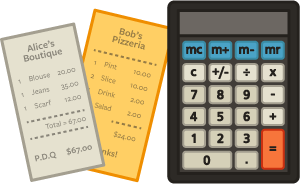Deducting moving expenses from your personal taxes

April 15 has long struck fear in the hearts of procrastinators everywhere — in the United States, anyway. Whether you owe or are owed, the process of filing one’s taxes isn’t exactly a walk in the park, but the Moveline team has a bit of good news for you: if you’ve moved in the past tax year due to a new job or job location, there’s a good chance you can deduct those expenses from last year’s federal taxes.
Even better news: the form you’ll need to fill out is likely one of the shortest and most straightforward documents the IRS offers. If you’re filing your 2012 taxes before the April 15, 2013 deadline, you’ll need Form 3903 for 2012 , entitled “Moving Expenses.” It only has five lines to fill out, and in them, you’ll report whether your move was paid for with your own out-of-pocket funds, your employer’s funds, or some combination of both. If you were left holding the bag on any amount of your moving costs after your employer’s limit was reached (or if you were paying for the process on your own to begin with), you can likely deduct that amount from the income you report.
How to deduct taxes related to your move:
-To qualify for a deduction, first and foremost your move must have taken place in the tax year for which you’re providing information to the IRS, and it must have taken place for either a job or a job location (i.e., you either relocated for work or your place of business moved far away, forcing you to move your residence to be closer to it.)
-You cannot deduct money that was actually spent by your employer; it’s not yours to claim. Any deductions you request must be as a result of your own out-of-pocket expenses.
-Per the IRS: “Under the ‘distance test,’ your new workplace must be at least 50 miles farther from your old home than your old job location was from your old home. If you had no previous workplace, your new job location must be at least 50 miles from your old home.”
-There’s also a “time test” which states that, according to the IRS, “If you are an employee, you must work full-time for at least 39 weeks during the first 12 months immediately following your arrival in the general area of your new job location.” Different parameters apply for taxpayers who are self-employed.
-It’s important to review all the exceptions and nuances to these rules; check the Moving Expenses page of IRS.gov for specific details.
This is just a basic primer to help you determine whether or not you might potentially qualify for a moving expenses deduction. When in doubt, always ask the IRS or a reputable tax accountant.
If you’ve moved since January or are planning a move for the upcoming year, be sure to keep all relevant documents accessible for the next tax season. And while you’re at it, letMoveline help you plan all the logistics and save money in the process. That’s why we’re here in the first place.
Back To Blog
